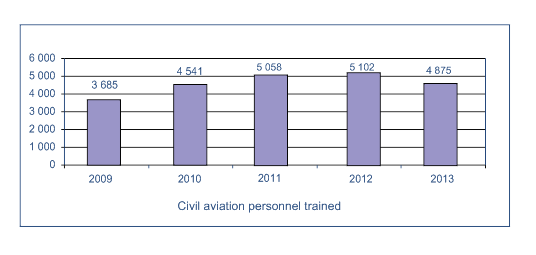A total of 623 fellowships were awarded for a combined duration of 344.5 work-months, as described below:
— 241 fellowships were awarded under country and regional technical cooperation projects funded by recipient governments or donors.
— 382 fellowships were awarded under Memoranda of Understanding signed by ICAO with Indonesia, the Republic of Korea and Singapore, for the provision of training to be funded by these countries and administered by ICAO. Of these:
• 60 fellowships for courses held at the Indonesia Air Transportation Human Resources Development Centre on aviation internal auditing, dangerous goods, legal aspects of aviation security, aerodrome certification and Safety Management Systems (SMS).
• 226 fellowships for training at the Civil Aviation Training Centre of Korea Airports Corporation and the Incheon Airport Aviation Academy. Related subject matter included air navigation policy, airport operations, aviation security national inspectors, airport terminal operations, radar approach control, instrument landing systems (ILS) maintenance, DVOR/DME maintenance, performance-based navigation (PBN), electronic safety tools, aviation security and safety, airport greenhouse gas management and aviation policy for executives; and
• 96 fellowships for training undertaken at the Singapore Aviation Academy, in civil aviation management, aviation leadership scholarship programme, Communications, Navigation and Surveillance/Air Traffic Management (CNS/ATM), the ICAO State Safety Programme, safety oversight inspectors (flight operations, airworthiness and air navigation services), safety audits of air traffic services, search and rescue administrators, and safety oversight management.
In addition, ICAO experts recruited through technical cooperation projects provided in-country training in various fields for 3 799 civil aviation administration personnel. Recipient States also continued to include substantial training for their nationals as part of the procurement component of their ICAO technical cooperation projects. A full 453 national staff benefited from training in new technologies and in the operation of equipment purchased through ICAO.
The training of management, technical and operational personnel was particularly important in terms of improving State oversight capabilities. According to information provided by Member States, personnel trained through the Technical Co-operation Programme are progressively absorbed by civil aviation administrations, which greatly benefit from the training and retention of a workforce of qualified aviation safety and security personnel, including inspectors.

